

Most ebook files are in PDF format, so you can easily read them using various software such as Foxit Reader or directly on the Google Chrome browser.
Some ebook files are released by publishers in other formats such as .awz, .mobi, .epub, .fb2, etc. You may need to install specific software to read these formats on mobile/PC, such as Calibre.
Please read the tutorial at this link: https://ebookbell.com/faq
We offer FREE conversion to the popular formats you request; however, this may take some time. Therefore, right after payment, please email us, and we will try to provide the service as quickly as possible.
For some exceptional file formats or broken links (if any), please refrain from opening any disputes. Instead, email us first, and we will try to assist within a maximum of 6 hours.
EbookBell Team

4.8
94 reviewsThe print cultures examined here are necessarily anti-institutional; they serve as a counterpoint to the colonial archive and, relatedly, to more traditional genres and text formats coming out of large-scale publishers. This means that much of the primary material analyzed in this book has not been scrutinized before. Many of these print productions articulate collective liberation projects with origins in the grassroots. They include debates around the shape of the postcolonial nation and the new state formation that necessarily draw on a diverse and contentious public sphere of opinion. Their rhetoric ranges from the reformist to the revolutionary.
Reflecting the diversity, indeed the disorderliness, of postcolonial print cultures this book covers local, national, and transnational cultures from Asia, Africa, Europe and the Americas. Its wide-ranging essays offer a nuanced and, taken together, a definitive (though that is not to say comprehensive or systematic) study of a global phenomenon: postcolonial print cultures as a distinct literary field. The chapters recover the efforts of writers, readers and publishers to produce a postcolonialism 'from below', and thereby offer a range of fresh perspectives on the meaning and history of postcolonialism.